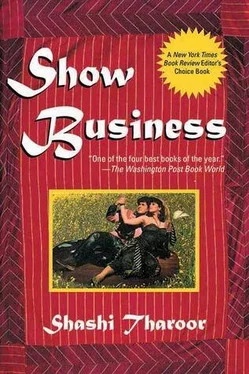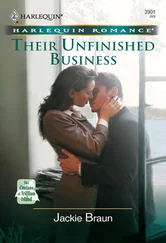“Fools! How dare you allow a mere CID inspector to come in the way of the plans of mighty Godambo!” The voice drops to a whisper, a gravelly one, but a whisper nonetheless. “We will deal with this Inspector Ashok,” he adds, each syllable dripping with menace. Pause. “You,” he commands the men, “may go now.”
Relief floods the pair’s nervous faces. “Thank you, mighty Godambo,” the thinner one stutters.
They bow, turn to leave. Godambo’s brocaded arm reaches out to a button on the armrest of his throne. He jabs his thumb on it, an eloquent gesture of dismissal.
Abruptly, the floor opens up in front of the departing men. They fall in with a short scream, quickly cut short by a glug.
The shark fin appears once more in the pool, circles, dives.
Godambo presses another button in a console beside him. A giant screen emerges: the two men are seen falling vertically into the water, their hair flowing upward, hands thrashing in despair. A dark shadow swims into the screen, lunges straight for them. Close-up: the thinner man’s eyes and mouth widen in a silent scream. The shark attacks again. Godambo watches impassively, then switches off the screen.
The water on the surface of the pool turns red.
“Fools,” he says. “For Godambo, failure is betrayal. And the punishment for betrayal is?”
The Black Cheetahs standing at attention reply in a chorus: “Death!”
“Death.” Godambo nods approvingly. He continues stroking the cheetah on his lap.
Inspector Ashok comes home to his widowed mother. Amma is of average height, with a round, curiously unlined face and a round, curiously unlined figure. She is draped in the colorlessness of chronic bereavement: white sari, white long-sleeved blouse, white pallav covering most of the white hair on her head. Her expression is both kind and long-suffering: Amma has been the hero’s widowed mother in so many films that she can no longer imagine herself in a colored sari. (Indeed, she can no longer imagine herself married, and so felt obliged to part from her inoffensive offscreen husband because it was too disorienting to come home to him after a day on the set.)
“Amma!” says Ashok. “Ashok!” says Amma. A heartfelt exchange of domestic pleasantries follows. Mother asks son to wash his mouth and hands quickly because she has made him carrot halwa. Son, obeying dutifully, inquires about mother’s welfare. Mother responds with her quotidian expression of maternal anxiety about the risks taken by her beta. Tearfully she invokes the fate of the father (whose garlanded framed photograph on the peacock-green wall, focused upon in a lingering close-up, reveals him to have been a police officer as well, complete with pencil-line mustache). Ashok, stirred more by the photo than by his mother’s entreaties, puts down his gajar ka halwa long enough to pledge to fulfill his father’s incomplete mission in life: to bring evildoers to justice and to marry off his daughter.
Enter on cue Maya, the daughter in question. She is sixteen and pigtailed and winsomely carries a stack of schoolbooks. Ashok beams with fraternal pride and asks after her studies. More pleasantries are exchanged. To complete the picture of familial unity and bliss, the trio bursts into song:
(Refrain):
We’re one small happy family,
We live and love together.
We’re one small happy family,
In sunshine and bad weather.
THE MOTHER:
We’re one small happy family,
Together we stand and fall.
We’re one small happy family,
All for each and each for all.
(Refrain, sung by trio)
ASHOK:
We’re one small happy family,
United, good and strong.
We’re one small happy family,
So nothing can go wrong.
(Refrain, sung by trio)
MAYA:
We’re one small happy family,
Looked after by our mother.
We’re one small happy family,
Protected by my brother.
(Refrain, sung by trio)
(Adoring glances are cast at each person as each is mentioned. As they sing the refrain, they link hands and dance around a red plastic sofa. They are, it is clear, one small happy family.)
“Agent Abha. Agent Pranay.” The gravelly voice, the cheetah, the pool (its surface again clean): we are back in the headquarters of the evil Godambo.
“Yes, boss.” The two step forward.
Abha is petite, pretty; she is in a designer version of the black commando outfit, with black suede boots and a gold lame chemise over her polo-neck top. But even the talents of the costumier cannot detract from her principal feature: she is built like an hourglass, but an Arab hourglass, perhaps, made by a timekeeper with sand to spare. Pranay is bigger, more strongly built, altogether more proportionate. But even the villagers in the twenty-five-paisa seats can see that he is dissolute; his narrow eyes are flecked with red, as is his narrow mouth, which is busily engaged in chewing paan. He sports a thick drooping black mustache, and for no apparent reason carries a whip in his right hand, with which he periodically and arhythmically smacks his left palm.
“I want you to get this Inspector Ashok for me. Agent Abha, you will seek him out. I want you first to find out how much Ashok knows about our operation. Then bring him to me, alive. I want to talk to him.” Godambo laughs gutturally, as if the gravel in his throat had been scattered by a passing vehicle. The cheetah, startled, raises its head. Godambo strokes its back. “Pranay, I want you to help Abha. You know what to do.”
Pranay chews some more and strikes his palm with the whip, wincing involuntarily. “Yes, boss.”
“Good,” says Godambo and laughs again. “I want to meet this Ashok. I want to see who is this inspector who dares to thwart the plans of mighty Godambo.”
“We will take care of it, Godambo,” says Abha.
“Good. And what is the penalty for those who dare to thwart Godambo’s plans?”
The commandos answer in chorus: “Death.”
Godambo laughs. “Death,” he echoes approvingly. The cheetah blinks.
Scene: a nightclub, of the kind found only in Hindi films. A large stage, bedecked with gilt and a dazzling mosaic of multicolored mirrors, faces a valley of white-clothed tables. Seated at these, their expressions bedecked with guilt, is an indeterminate collection of diners, also white-clothed, none of whom look as if they can afford a place like this. (Indeed, they can’t; they are all extras, or “Junior Artistes” as the trade prefers they be called, roped in at seventy rupees a day.) They seem remarkably uninterested in the food before them; that is because they are under strict instructions from the executive producer not to consume it. (Their own, somewhat more frugal, repast awaits them in the studio canteen after the shift.) Along one bottle-lined wall is a bar, also surprisingly untenanted: not even a bartender is visible. The reason will soon be apparent — the bar is meant only to serve as a backdrop for our hero, who will lean against it but not drink (one can never be too sure about how well alcohol will go down with our rural moralists). The lights dim; a single spotlight appears on the stage, illuminating a man with a narrow, red-stained mouth and a drooping mustache. Yes, it is none other than Pranay, except that his whip has been replaced by a pair of drumsticks. He is the percussionist of the evening, and apparently the master of ceremonies as well.
“Laddies and genurrmen,” he slurs into the mike before him, “the one and only — Abha!”
A roll of drums. The spotlight moves away from him, casting rainbow patterns on the mirror mosaic. As the music builds, red and gold rectangles of stage glass part to admit the star. Hips swiveling in a sheathlike gown slit at the calves, fake diamonds sparkling at her throat and wrists, wireless mike in exquisite hand, Abha twists onto the stage. She smiles at the audience just as Ashok walks in. He is in a tuxedo, complete with black bow tie; not the standard off-duty garb of your average police officer, but the cinema-loving villagers don’t know that. (Nor, for that matter, will they ask what on earth an honest middle-class cop is doing in a place like this. The Indian film industry is built on their ignorance and on their willing suspension of disbelief.)
Читать дальше












